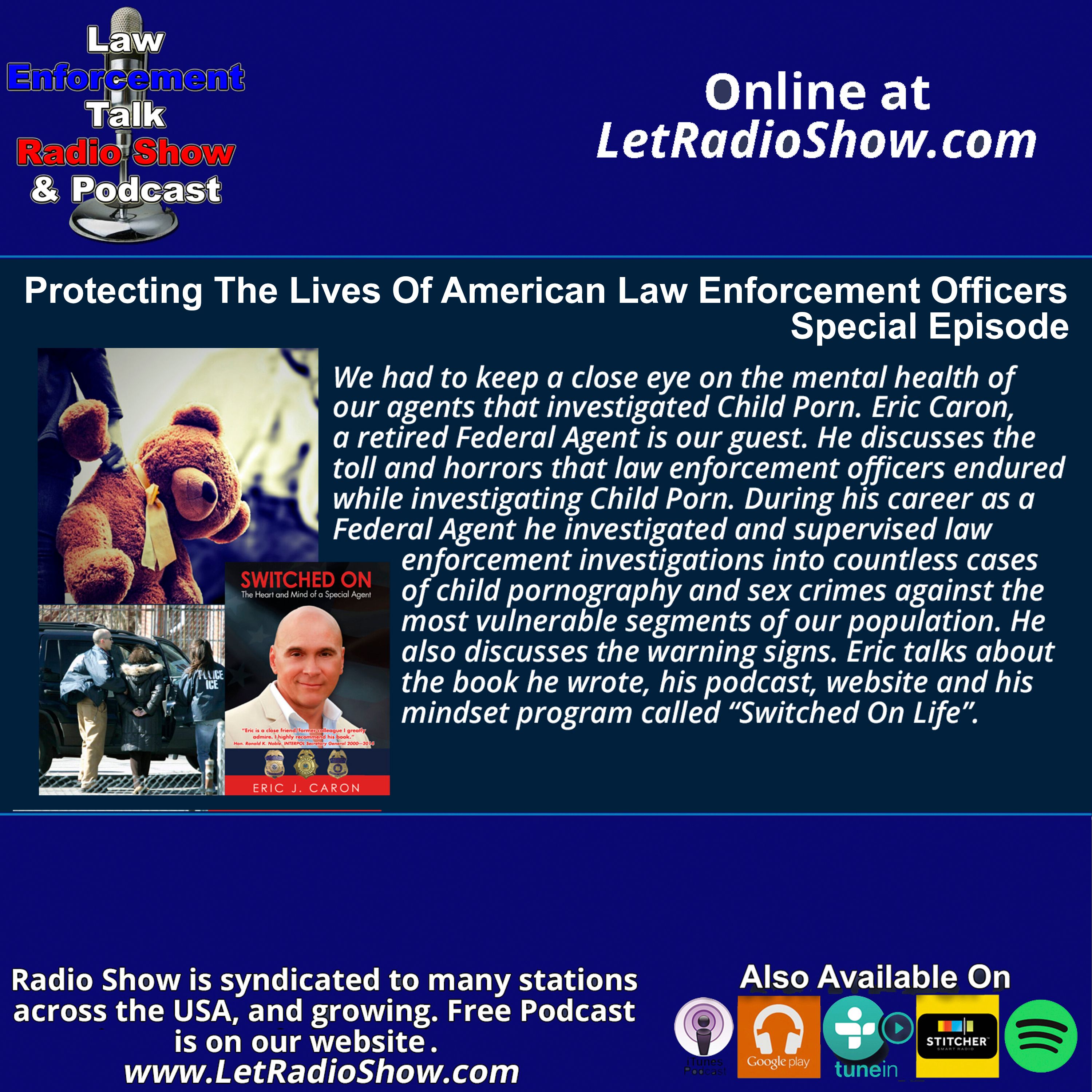
Protecting The Lives Of American Law Enforcement Officers: A Special Episode on Trauma, Health, and Hope. The average life expectancy for American law enforcement officers is just 57 years, a stark contrast to the general population’s 78 to 79 years. Behind that number lies a sobering reality: a career spent protecting others often comes at the expense of one’s own health. This special episode of the Law Enforcement Talk Radio Show and Podcast is available for free on their website, also on Apple Podcasts, Spotify, Youtube and many other podcast platforms.
Heart disease, chronic stress, trauma, and the relentless demands of the badge all play a role. “Many officers only live a few years into retirement,” says John Jay Wiley, host of the Law Enforcement Talk Radio Show and Podcast. “That’s not just a statistic, it’s a tragedy that reflects the immense pressure these men and women endure.” Law Enforcement Talk Radio Show and Podcast social media like their Facebook , Instagram , LinkedIn , Medium and other social media platforms.
In this Special Episode, available on Facebook, Instagram, LinkedIn, YouTube, X, Apple, Spotify, and Radio, Wiley welcomes Eric Caron, a retired U.S. Special Agent and Diplomat, to discuss the unseen toll of the job, and the urgent need to protect the mental and physical well-being of those who protect us. Look for supporting articles about this and much more from Law Enforcement Talk Radio Show and Podcast in platforms like Medium , Blogspot and Linkedin .
The Hidden Cost of the Badge, Protecting The Lives Of American Law Enforcement Officers: A Special Episode on Trauma, Health, and Hope.
Officers face risks that go beyond the dangers of the streets. Studies show that law enforcement professionals have:
A much higher rate of heart disease, with heart attacks often striking as early as age 46, compared to 65 in the general population.
Elevated risks of hypertension, diabetes, and obesity, conditions tied directly to chronic stress and irregular shift work.
Shorter retirements, with many officers passing away just a few years after leaving the job.
“It’s not just the stress of one bad day,” Wiley explains. “It’s the accumulation of hundreds of critical incidents over a career, what we call death by a thousand cuts.” Available for free on their website and streaming on Apple Podcasts, Spotify, and other podcast platforms.
The Psychological Battle
Caron, who spent years investigating child pornography and sex crimes, describes the haunting reality of prolonged exposure to such cases. “When you’re staring into that darkness every day, it leaves a mark,” he says. “You see the worst of humanity, and it takes discipline and community to not let that darkness consume you.” Protecting The Lives Of American Law Enforcement Officers: A Special Episode on Trauma, Health, and Hope.
According to research, trauma in law enforcement leads to alarmingly high rates of PTSD, depression, and anxiety:
PTSD rates among police officers reach as high as 35%*, compared to 6.8% in the general population.
Officers are far more likely to experience emotional numbing, hyperarousal, and flashbacks from traumatic events.
Many suffer from compassion fatigue, a type of emotional burnout caused by repeated exposure to tragedy and human suffering.
Caron explains that repeated exposure to graphic violence and child exploitation can cause what psychologists call traumatic layering. “It’s not one event, it’s hundreds,” he says. “Each one leaves a scar.” The Law Enforcement Talk Radio Show and Podcast episode is available for free on their website , Apple Podcasts , Spotify and most major podcast platforms.
The Ripple Effects
The consequences of trauma ripple through every aspect of an officer’s life:
Emotional strain often leads to relationship issues and isolation.
Negative coping mechanisms, like alcohol or substance use, are far too common.
Cognitive impairment from chronic stress affects memory, judgment, and performance on duty.
Physical health problems such as high blood pressure, gastrointestinal issues, and cardiovascular disease frequently follow.
“Every case, every call, adds another layer,” Wiley says. “And too often, we lose great people not in the line of duty, but to the silent battles they fight afterward.” Protecting The Lives Of American Law Enforcement Officers: A Special Episode on Trauma, Health, and Hope. The full podcast episode is streaming now on Apple Podcasts, Spotify, and across Facebook, Instagram, and LinkedIn.
Protecting Those Who Protect Us
Throughout the conversation, Caron shares the methods he and his teams used to safeguard their mental health while investigating the most disturbing crimes imaginable. “We had to find ways to stay human,” he says. “Exercise, faith, humor, and having a strong support system, it all mattered.”
Caron now dedicates his post-service career to helping others stay “Switched On”, the philosophy behind his bestselling book SWITCHED ON, The Heart and Mind of a Special Agent and his mindset program, Switched On Life. Through his writing, website, and podcast, Caron teaches strategies for resilience, emotional control, and self-awareness in high-stress careers.
The Message
This Special Episode of the Law Enforcement Talk Radio Show and Podcastdoesn’t shy away from difficult truths, it confronts them head-on. The mission is clear: Protecting The Lives Of American Law Enforcement Officers means more than providing armor and training; it means offering the emotional tools and mental health resources to survive the job, and life after the badge. Protecting The Lives Of American Law Enforcement Officers: A Special Episode on Trauma, Health, and Hope. You can find the show on Facebook, Instagram, Pinterest, X (formerly Twitter), and LinkedIn, as well as read companion articles and updates on Medium, Blogspot, YouTube, and even IMDB.
“Cops are trained to run toward danger,” Wiley says. “But they’re not trained to deal with what that danger does to their hearts and minds over time. That’s why we have these conversations.”
Join the conversation. Share your thoughts, stories, and support for those who serve and for those who carry the invisible weight of that service every day.
Be sure to follow us on X , Instagram , Facebook, Pinterest, Linkedin and other social media platforms for the latest episodes and news.
You can help contribute money to make the Gunrunner Movie . The film that Hollywood won’t touch. It is about a now Retired Police Officer that was shot 6 times while investigating Gunrunning. He died 3 times during Medical treatment and was resuscitated. You can join the fight by giving a monetary “gift” to help ensure the making of his film at agunrunnerfilm.com .
Background song Hurricane is used with permission from the band Dark Horse Flyer.
You can contact John J. “Jay” Wiley by email at Jay@letradio.com , or learn more about him on their website .
Get the latest news articles, without all the bias and spin, from the Law Enforcement Talk Radio Show and Podcast on Medium , which is free.
“If you enjoy the show,” John Jay Wiley adds, “please share it with a friend or two, or three. And if you’re able to leave an honest rating or review, it would be deeply appreciated.” The Law Enforcement Talk Radio Show and Podcast is available for free on Apple Podcasts, Spotify, YouTube, and LETRadio.com, among many other platforms.
Stay connected with updates and future episodes by following the show on Facebook, Instagram, LinkedIn, their website and other Social Media Platforms.
Find a wide variety of great podcasts online at The Podcast Zone Facebook Page , look for the one with the bright green logo.
Be sure to check out our website .
Protecting The Lives Of American Law Enforcement Officers: A Special Episode on Trauma, Health, and Hope.
Attributions
Hosted by Simplecast, an AdsWizz company. See pcm.adswizz.com for information about our collection and use of personal data for advertising.







